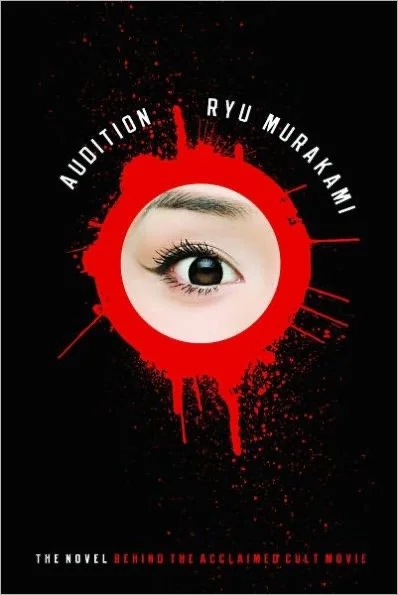Audition (1997) - Book Review
What if I told you that one of my favorite movies is equal to the book it’s based on?
What if I told you, they’re actually two separate stories altogether?
Let’s discuss.
Audition is a 1997 novel by the brilliant Japanese writer, Ryu Murakami. Most will know the title from the film adaptation by Takahashi Miike, which was released in the US in 1999. The novel didn’t receive an English translation until a decade later and faced undue criticism and comparison to the film. Many reviewers complained about the outdated writing style and references, but few reviews I’ve scanned through advise that the book was originally written in 1997. All reviews seemed to treat the book as a modern release. Murakami is an underrated writer, and due to the success of the film adaptation, he was essentially marginalized by the US publishing industry. It’s only in recent years that he’s finally received his due credit through the rereleases of his catalog with modern covers and artwork. Murakami was one of the few writers willing to illustrate the underbelly of Japan and its cultural taboos in his time. Much like the American writer, Jack Ketchum, Murakami gives an unflinching, brutal image of life in middle to lower-class Japan.
The book focuses on the life of Aoyama, a wealthy widower in his middle age, as he tries to find someone to share his life with. Rather than utilize matchmaking services or go on regular dates, he opts to accept the creepy offer of his best friend, Yoshikawa, to hold auditions for a fake reality television competition show. The goal of which is to give Aoyama the ability to quickly interview and assess young, available women, and have his pick of the litter. While Aoyama feels apprehension, especially as many of the women are asked to strip naked (standard for the time in Japan), He becomes fixated on a peculiar girl. He sees something in this strange, soft-spoken former ballet dancer with great references and a timid exterior. Ignoring obvious red flags in the woman’s demeanor and her shadowy past, Aoyama dives headlong into the relationship. What follows is a bloody lesson in the price of chauvinism and the brutal cost society pays for having no regard for psychological care.
It’s a horrible synopsis, but I don’t want to spoil the book. If you’ve seen the movie, then you already know most of the ending. However, the book fills in many blanks and expands the story to be less of a fever dream and more of a serial killer thriller.
While Miike’s film gets all the praise, it doesn’t give you much of the story.
I love the film and always will, but the complete story in the book provides so much context to the events in the film. There’s also a larger cast of players. In the film, Aooyama is shown to have no social life, but in the book, he has friends, a regular dive bar he hangs out at, and other human connections at work. He has far more resources, but comes to the same conclusion. This makes the book even more terrifying as you, the reader, know something is very wrong with the love interest, but no matter how many times his friends tell him that the girl is scary, he keeps his pursuit. It’s like Mr. Rhythm always said:
Don’t let your dick run your life!
In the film, there’s just good and evil. Aoyama is the awkward, long-suffering widower. He’s nice, soft-spoken, and respectful. In the book, it’s more realistic. He’s a man forced into an almost Otaku-like existence by his grief. His wife’s death strips away all of his self-confidence, and the modern
The girl is insane due to the abuse she received as a child. It’s implied she’s killed before, but she’s portrayed as batshit insane—which in the film is absolutely terrifying. In the book, she’s cold and calculating. She is in full control of her faculties. She meticulously plans the murder like most women would plan their weddings. It’s also explained why she follows this M.O. Some have said this ruins the shock of the ending, but I disagree.
Having the answers gives the ending of the novel a distinctly different feel. It’s a more layered and nuanced conclusion that I couldn’t get out of my head for weeks.
So, ignore the reviews from the book’s original release.
It’s a classic released 10 years too late.
You can listen to the Audiobook on Spotify Premium as part of your subscription. Otherwise, you can get one of the sick new paperback covers cheaply on Amazon.

